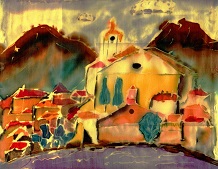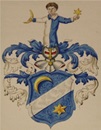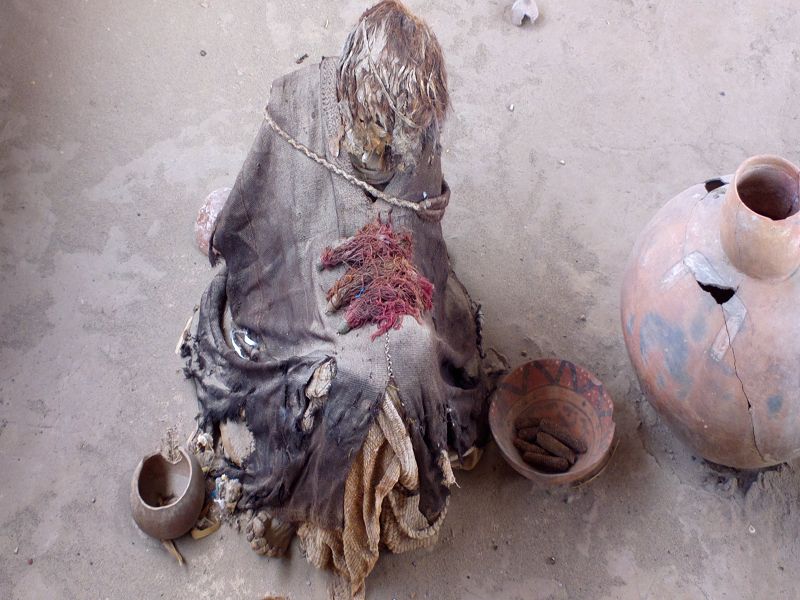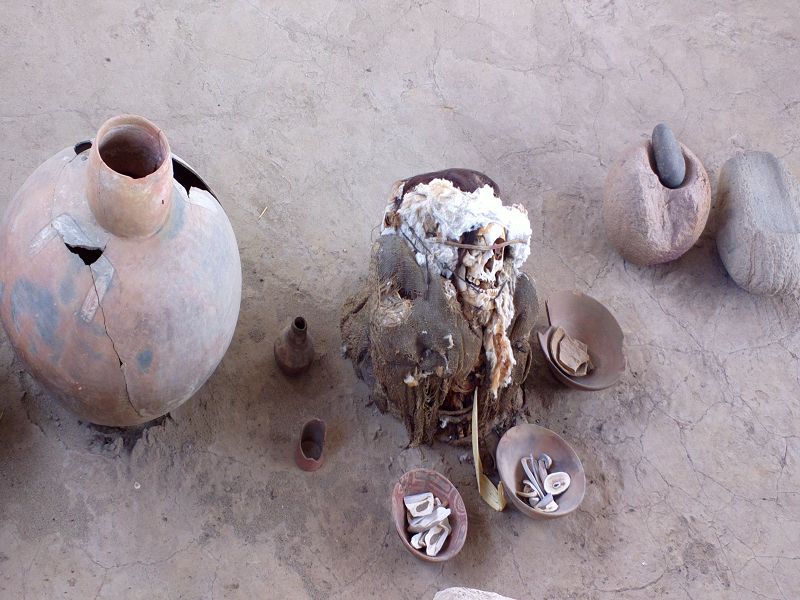|
Chauchilla is an ancient archaeological site located in the
Nazca Desert, in southern
Peru, near the town of Nazca.
The site is famous for its well-preserved
mummies and
tombs, which offer
significant insights into the
Nazca culture and their burial practices. The
Chauchilla Cemetery is
one of the most important pre-Columbian burial sites in the
Nazca region, revealing
a fascinating glimpse into the lives and beliefs of this ancient
civilization.
Key Features of Chauchilla:
1. Historical and Archaeological
Significance:
-
Nazca Culture:
Chauchilla dates back to the
Nazca civilization, which flourished in the region between
200 CE and
600 CE. The Nazca
people are well known for their
advanced agricultural
practices, their
geometric and animal-shaped geoglyphs (Nazca Lines), and
their ceramics.
-
Tombs and Mummies:
The site is home to ancient
tombs that contain mummies of
Nazca people, which
have been incredibly well-preserved due to the dry desert climate.
The mummies were placed in
seated positions, wrapped in
cloth, and buried
with offerings
such as ceramics,
textiles, and
jewelry. The
mummies are often bundled with their heads facing upward and their
legs bent, providing insight into how the Nazca people buried their
dead.
-
Tomb Structures:
The tombs at Chauchilla are typically
shallow burial pits,
covered by stone slabs
and adobe structures.
Over time, some tombs have been disturbed by grave robbers, but many
remain relatively intact. The tombs are arranged in a way that
reflects the social status of the individuals buried there, with
some tombs more elaborate than others.
2. Preservation and
Mummification:
- The dry, arid climate of the
Nazca Desert has
played a crucial role in preserving the mummies and artifacts at
Chauchilla. Due to the low
humidity, the bodies of the deceased were naturally
preserved through a process of
desiccation.
-
Mummification Practices:
The Nazca people practiced
deliberate mummification of their deceased, which involved
wrapping the body in textiles, drying it out in the sun, and
sometimes removing internal organs. The process was likely done to
honor the dead and prepare them for the afterlife, with the idea
that the mummies would continue to watch over their living
descendants.
-
Sacrificial Offerings:
In addition to mummies, archaeologists have discovered many
burial goods in
the tombs, including
ceramic vessels,
textiles, and
woven bags. These items were likely intended to provide for
the deceased in the afterlife.
3. Artifacts and Cultural
Insights:
-
Textiles: One of
the most notable finds at Chauchilla are the
Nazca textiles,
which showcase the skill and artistry of the civilization. The
textiles often depict intricate geometric designs, animals, and
humans. Some of these textiles were used as burial shrouds, while
others were likely items for use in ceremonial practices.
-
Ceramics: The
ceramics discovered at Chauchilla include
pottery vessels,
figurines, and
masks. Many of
these ceramics feature the distinctive
Nazca artistic style,
with motifs such as
mythological figures,
geometric patterns,
and animals. The
Nazca are known for their vibrant, highly decorated pottery.
-
Skulls and Jars:
Some tombs at Chauchilla contain
skulls with
elongated shapes,
which is believed to be the result of a
cranial modification
practice. The Nazca people may have intentionally shaped the skulls
of infants, possibly as a sign of social status or as part of
cultural traditions. Archaeologists have also found
ceramic jars with
faces or heads carved on them, which likely had ritual significance.
4. The Nazca Lines Connection:
- Chauchilla is closely
associated with the Nazca
Lines, a series of massive geoglyphs etched into the desert
floor, located near the town of
Nazca. The
Nazca Lines are a
mysterious archaeological wonder, featuring enormous geometric
shapes and representations of animals, plants, and deities. Some of
the Nazca Lines are thought to have had
ritual significance,
and it's possible that the mummies and tombs at Chauchilla were part
of the broader religious
and ceremonial life of the Nazca people.
5. Tourism and Visiting
Chauchilla:
-
Access: The
Chauchilla Cemetery is located about
30 kilometers (18 miles)
southeast of the town of
Nazca, making it a popular day trip for tourists visiting
the Nazca region. It is easily accessible by car or organized tour
from Nazca.
-
Tours: Most
visitors explore Chauchilla with a
guided tour,
which provides detailed explanations of the tombs, mummies, and
artifacts, as well as the cultural context of the Nazca
civilization. The site has been preserved and maintained to ensure
that future generations can learn about its historical importance.
-
Museum: There is
also a small museum
at the entrance of the site, where visitors can view
additional artifacts,
including ceramics,
textiles, and
other relics found at the site.
6. Preservation Challenges:
-
Looting and Vandalism:
Over the years, Chauchilla has been vulnerable to
grave robbing and
vandalism. Many
of the tombs were looted in the past, and although the site has been
protected in recent years, there are still concerns about the
preservation of the mummies and artifacts.
-
Conservation Efforts:
The Peruvian government, along with archaeologists and
preservationists, have worked to protect and conserve Chauchilla.
This includes building protective structures over the tombs,
limiting access to some areas, and restoring damaged tombs. The arid
desert climate has helped preserve many of the mummies, but
continued conservation efforts are necessary to maintain the site’s
integrity.
Conclusion:
Chauchilla is a fascinating and culturally rich archaeological site that
offers a unique window into the
Nazca civilization.
With its well-preserved mummies, tombs, and burial artifacts, it
provides valuable insights into the
rituals,
beliefs, and
burial practices of
the ancient Nazca people. Whether you're a history enthusiast, an
archaeology fan, or simply a traveler seeking to explore the wonders of
ancient Peru, Chauchilla Cemetery is an essential stop in the
Nazca region,
complementing the mysterious and iconic
Nazca Lines nearby.
|
|
 Safaris
Bergsteigen
Wandern
Inselwandern Weltweit
Safaris
Bergsteigen
Wandern
Inselwandern Weltweit
 Europa
Inselwandern
Europa
Inselwandern
 Städtewandern
Städtewandern
 Paintings
Paintings Dirk Rauschenbach
Dirk Rauschenbach
 Safaris
Bergsteigen
Wandern
Inselwandern Weltweit
Safaris
Bergsteigen
Wandern
Inselwandern Weltweit
 Europa
Inselwandern
Europa
Inselwandern
 Städtewandern
Städtewandern
 Paintings
Paintings Dirk Rauschenbach
Dirk Rauschenbach



![]() 26.07.25 Copyright Dirk
Rauschenbach Koelnerstrasse 293 51702 Bergneustadt
Datenschutzerklaerung 02261 9788972 Mail ccooly(
at) web.de
26.07.25 Copyright Dirk
Rauschenbach Koelnerstrasse 293 51702 Bergneustadt
Datenschutzerklaerung 02261 9788972 Mail ccooly(
at) web.de